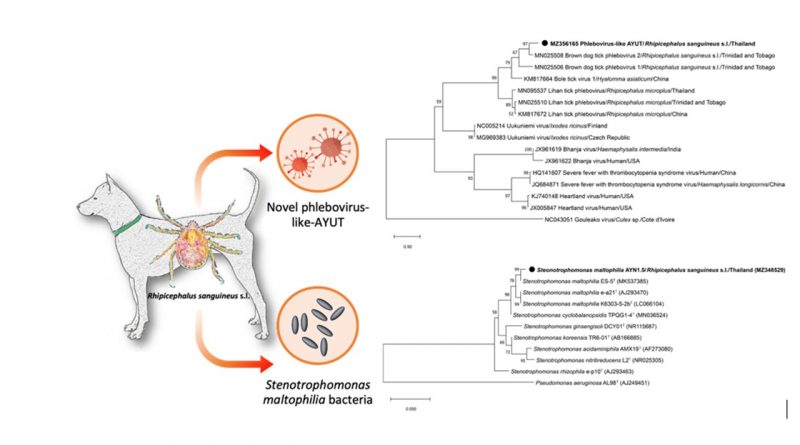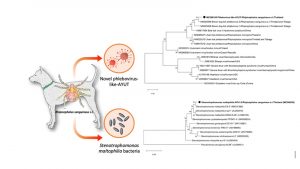Highlight Activities 2022: Novel phlebovirus-like-AYUT and Stenotrophomonas maltophilia bacterial co-infection in a Rhipicephalus sanguineus s.l. tick
Summary: Tick-borne viruses and bacteria that can cause diseases of animals and humans have high impact and are of concern as significant threats to human health worldwide. In this research, we screened microorganisms related to those pathogens in ticks from dogs, a cat, and a cow. The techniques used were PCR, DNA sequencing and phylogenetic analysis to detect and classify the microorganisms [Flavivirus, severe fever with thrombocytopenia syndrome virus (SFTSV), Phlebovirus, Coronavirus, Canine Parvovirus, eubacteria, Coxiella and Rickettsia]. A novel virus named Phlebovirus-like-AYUT and Stenotrophomonas maltophilia bacteria were found in one individual tick (Rhipicephalus sanguineus s.l.) from a dog. All tick samples were negative for Rickettsia, while 9/21 (42.9 %) were positive for Coxiella bacteria. The novel virus “Phlebovirus-like-AYUT” (the name derives from Phra Nakhon Si Ayutthaya Province in Thailand) was resolved by phylogenetic analysis of the partial L segment by maximum likelihood (ML) method using MEGA X. The phylogenetic tree also indicated that the virus was related to Phlebovirus in brown dog ticks reported in Trinidad and Tobago. In contrast, Phlebovirus-like-AYUT was in a distinct clade from Lihan tick Phlebovirus-Thailand (LTPV), which was previously found in cow ticks, Rhipicephalus microplus, in Nan Province, Thailand. This study reports the Stenotrophomonas maltophilia bacterium with a novel Phlebovirus-like-AYUT in a brown dog tick. The roles of this bacterium in a virus-positive tick or in viral transmission from animal host requires further investigation.
Reference
Trinachartvanit, W., Kaenkan, W., Nooma, W., Jeangkhwoa, P., Rakthong, P., Baimai, V., and Ahantarig, A. (2022). Novel phlebovirus-like-AYUT and Stenotrophomonas maltophilia bacterial co-infection in a Rhipicephalus sanguineus s.l. tick. Veterinary research communications, 46(1), 277–282. https://doi.org/10.1007/s11259-021-09855-7


